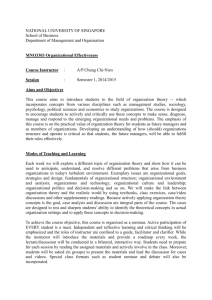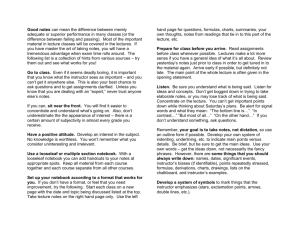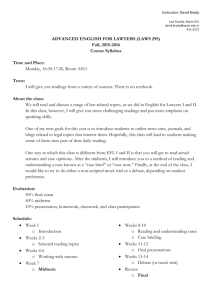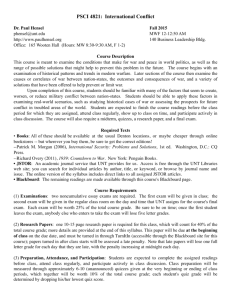Syllabus: must include attendance policy (may affect grade), grading
advertisement
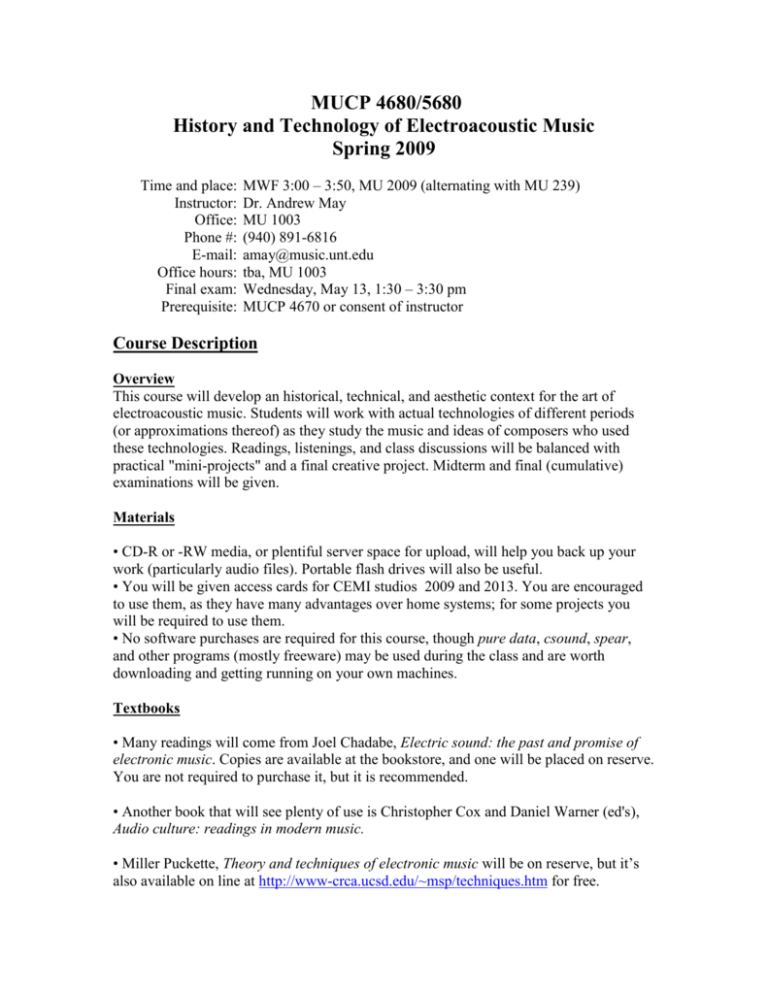
MUCP 4680/5680 History and Technology of Electroacoustic Music Spring 2009 Time and place: Instructor: Office: Phone #: E-mail: Office hours: Final exam: Prerequisite: MWF 3:00 – 3:50, MU 2009 (alternating with MU 239) Dr. Andrew May MU 1003 (940) 891-6816 amay@music.unt.edu tba, MU 1003 Wednesday, May 13, 1:30 – 3:30 pm MUCP 4670 or consent of instructor Course Description Overview This course will develop an historical, technical, and aesthetic context for the art of electroacoustic music. Students will work with actual technologies of different periods (or approximations thereof) as they study the music and ideas of composers who used these technologies. Readings, listenings, and class discussions will be balanced with practical "mini-projects" and a final creative project. Midterm and final (cumulative) examinations will be given. Materials • CD-R or -RW media, or plentiful server space for upload, will help you back up your work (particularly audio files). Portable flash drives will also be useful. • You will be given access cards for CEMI studios 2009 and 2013. You are encouraged to use them, as they have many advantages over home systems; for some projects you will be required to use them. • No software purchases are required for this course, though pure data, csound, spear, and other programs (mostly freeware) may be used during the class and are worth downloading and getting running on your own machines. Textbooks • Many readings will come from Joel Chadabe, Electric sound: the past and promise of electronic music. Copies are available at the bookstore, and one will be placed on reserve. You are not required to purchase it, but it is recommended. • Another book that will see plenty of use is Christopher Cox and Daniel Warner (ed's), Audio culture: readings in modern music. • Miller Puckette, Theory and techniques of electronic music will be on reserve, but it’s also available on line at http://www-crca.ucsd.edu/~msp/techniques.htm for free. Readings and Listenings Weekly readings and listenings (and some video viewings) will be assigned (and others will be recommended). The materials will be available from library reserves and/or online materials. Your instructor will make mp3 recordings of most of the required listenings available on-line for your reference and study, but you should make a point of listening at full fidelity, with minimal distractions (e.g. no computer), in the library. That’s another of the great opportunities of the library! You will send weekly e-mails to your instructor documenting your observations about the listenings and their interrelations with the readings. Note that comments expressing your personal taste and opinions about music are not relevant to these assignments. The object of this exercise (other than to verify that you did the work) is for you to develop your listen critically and describe clearly the sounds you hear, and to infer accurately how and why they were made. These are useful skills! An extensive list of recordings and books is reserved in the library for this course; beyond your assigned readings and listenings, and others that will be recommended, you should browse the reserves to learn more about topics of particular interest to you (that’s one of the great opportunities of a great library like ours). Projects Regularly assigned projects will involve practical tasks exploring particular technologies. Many of these projects will be assigned as team efforts – keep an eye out for your ideal collaborators within the class. These will be opportunities to learn, handson, things you just can’t learn from books. They may also produce interesting artwork. There will also be some short writing assignments, in addition to the weekly reading/listening commentaries. Most of these will be invitations to envision possible musical technologies or applications. The final project (due Wednesday, May 6) will be a work of music that you complete in a modern computer music environment, and will integrate aspects of what you have learned through work with other technologies. Examinations Midterm and final exams will be cumulative and will cover the materials studied in class in a "scattershot" manner. Course Policies Grading Reading/listening e-mails Projects Final project Midterm exam Final exam Attendance and participation 20% 30% 10% 10% 20% 10% Attendance policy You have liberty of movement, but there are consequences to your choices. This course will move fast; you will become very confused if you do not attend regularly. Attendance will also be part of your grade, as noted above. In case of 6 or more unexcused absences, the instructor reserves the right to summarily assign you a failing grade for the course. Academic dishonesty policy see also http://www.unt.edu/policy/UNT_Policy/volume3/18_1_11.html 1) Cheating. The term “cheating” includes, but is not limited to: (a) use of any unauthorized assistance in taking quizzes, tests, or examinations; (b) dependence upon the aid of sources beyond those authorized by the instructor in writing papers, preparing reports, solving problems, or carrying out other assignments; (c) the acquisition, without permission, of tests, notes or other academic material belonging to a faculty or staff member of the university; (d) dual submission of a paper or project, or resubmission of a paper or project to a different class without express permission from the instructor(s). (e) any other act designed to give a student an unfair advantage. 2) Plagiarism. The term “plagiarism” includes, but is not limited to: (a) the knowing or negligent use by paraphrase or direct quotation of the published or unpublished work of another person without full and clear acknowledgement and (b) the knowing or negligent unacknowledged use of materials prepared by another person or by an agency engaged in the selling of term papers or other academic materials. Disability policy see also http://www.unt.edu/policy/UNT_Policy/volume2/6_8_3.html Individuals qualifying under the Americans with Disabilities Act (ADA) who need special assistance to participate in a program, service or activity sponsored by the University Union are asked to contact the Verde Scheduling Office, a minimum of three business days in advance of when they will need the requested assistance to allow time for the request to be handled in an appropriate manner. The Verde Scheduling Office is located on the level 2 of the University Union. Telephone: (940) 565-3804, 565-3806 or TDD access through Relay Texas 1-800-735-2989. Course Outline January 21 and 23: introduction, what machines want from us, early instruments (add/drop ends January 23) January 26, 28, 30: musique concrête, elektronische musik, and early techniques Project 1 – instrument design – due January 28 February 2, 4, 6: analog studio techniques: tone generators, tape, reverb, filters (February 2 is last day to drop with refund) February 9, 11, 13: analog synthesis techniques and voltage control Project 2 - tape music composition – due February 11 February 16, 18, 20: computer music techniques: from Music N to csound February 23, 25, 27: digital hardware techniques: FM synthesis, sampling, etc Project 3 – soft analog performance synth – due February 25 March 2, 4, 6: commercial hardware, popular music, new music and new wave Project 4 – digital design - due March 4 March 9, 11, 13: buffers, windows, and the liberation of numbers (plus a harmonizer) Midterm examination: Friday, March 13 (Spring Break March 14-22) March 23, 25, 27: what’s in a window? granulation, format synthesis, FFT, etc March 30, April 1, 3: frequency domain: principles, decomposition, resynthesis Project 5 – FFT instrument design – due April 3 April 6, 8, 10: frequency domain: bin-shifting, convolution, phase vocoding April 13, 15, 17: live vs. real-time vs. interactive – and what happened at IRCAM April 20, 22, 24: the situation today: fixed, spatialized, live, interactive, intermedia Project 6 – follow the leader – due April 20 April 27, 29, May 1: final project work and review May 4, 6, 8: Pre-finals week, review Final project due: Wednesday, May 6 – during pre-finals! Final examination (cumulative): Wednesday, May 13, 1:30 – 3:30 pm ****** All dates and topics are subject to change! ******** (and you can suggest changes as we go along …)

